Tested Tips To Practice Self Care And Mental Healing
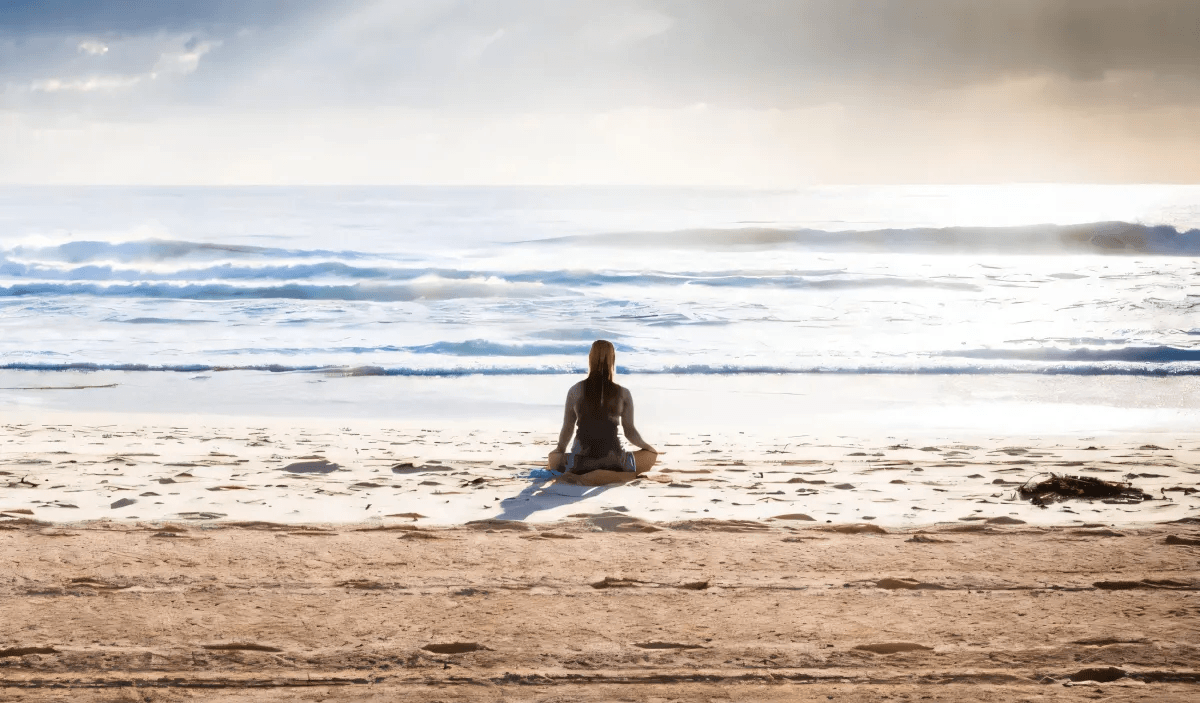
Ingredients Required:
- Yourself- 1 Whole
- Will- 50 cups
- Faith- A pinch
- Strength- 10 Tbsp
- Music- Preferably your own voice
- Paints- 20 Tbsp
- A Terrace
These are the following steps that you should follow to heal yourself, evolve into a more soothing being and for a calmer mind and soul:
Step 1: Preset your phone on airplane mode or better switch it off.
Less excited about that prospect? Here are some findings to entice you: New research suggests that our capacity and ability to process emotions and feelings may improve when our phone is away from us. Think that turning it on silent, face down, will remedy the problem? Nope. The mere sight of the notifications on your phone might diminish your cognitive resources.

In addition to this, a visible phone in a social setting can drastically reduce the depth of the interaction, creating more superficial social exchanges. Scrolling, swiping, liking, and commenting obsessively through social media isn’t the only battle you need to fight. Another disturbing fact is that this tally seems to increase daily, the typical smartphone user interacts with their phone around 85 times per day. And this often includes middle-of-the-night checks for work emails and new ‘likes.’ We’re so obsessed that there’s now a word to describe irrational fear of being without your phone: “Nomophobia.”
Mostly, we are not even aware of how profoundly uncomfortable we become without any notifications on our phones. For years, we have been using our phones every time we have a spare moment in an elevator or a boring meeting. We listen to podcasts and write emails on the subway. We watch YouTube videos while folding laundry. We even use an app to pretend to meditate or relax.
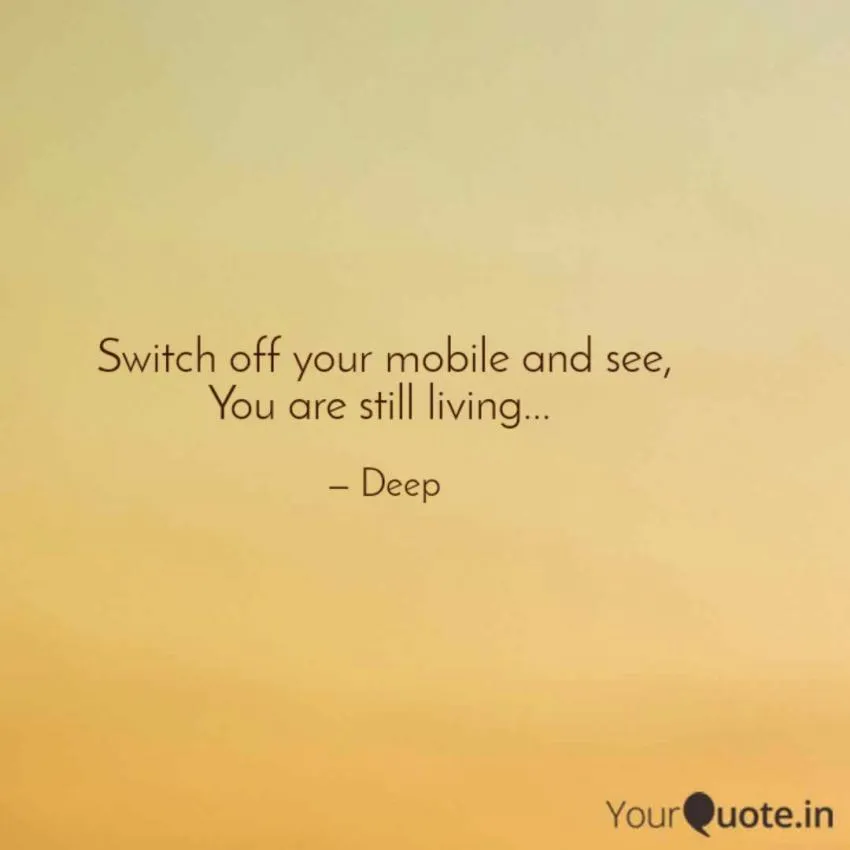
It’s an unnerving sensation, being alone with our thoughts in the 21st century. So, if we want to take the first step towards healing or self-care, we need to practice doing nothing. So during our morning walk, let’s look up at the buildings around us, spotting architectural details you might have never noticed before. On the subway, let’s keep our phone in our pockets and watch people — notice the weirdly dressed man in the yellow hat, the teens joking around and laughing, the kid with noisy shoes. When a friend is running late for lunch, let’s sit still and stare out of the window instead of checking Instagram or Twitter.
Our usage of the phone should be a conscious choice. A positive tool — something useful in our life, not something that detracts from it. There is a life beyond the internet, has always been and will always be. Let’s all try to experience the richness of technology with mindfulness and discipline, not at the cost of our mental health. So, the lesser the phone time, the more time we save for healing ourselves or on self-care. This way we will be able to grow better, enjoy our lives, and thrive.
Step 2: Simmer yourself in a bathtub or stand under a shower of perfectly heated water for as long as you want.
Amidst stress, anxiety, uncertainty, and, excess time, stepping into the shower is no longer just an effective to-do, it’s an act of serene self-care—particularly when you take your time and add those few extra steps that transform it into a fully soothing and comforting ritual. From creating a warm, grounding environment to therapeutic skin-care treatments, here’s how to make your shower a place of respite and relaxation.
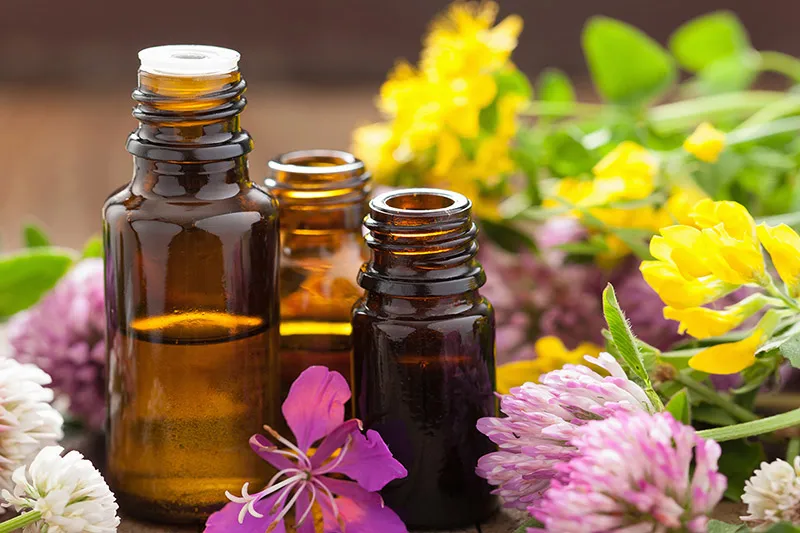
First things first, you need to set the mood. The mood we’re going for is calm, relaxing, and soul-soothing. Do your best to achieve perfect light. You can do that by using natural light if your bathroom has a window, or if not, you can light candles. A beautiful, scented candle is definitely a mood lifter. This is also the time when you set up any aromatherapy essential oils and turn on your music.
Choose music that works for you, if rapping along to trap music is therapeutic to you then go ahead. If instrumental music and chill beats and soothing soul tunes are what you need to relax then that’s what you turn on. It’s up to you and what you think you need to get yourself into the right mindset to start the day. What I will say is that you do need to be thoughtful in the music you choose. Thoughtfulness is a big component of self-care.
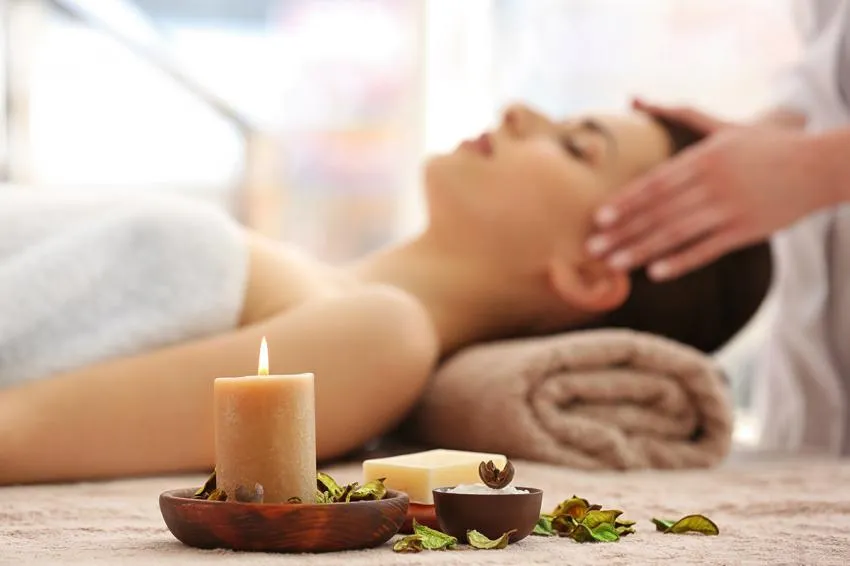
Before entering the shower, take a dry brush and gently massage yourself head to toe in long, circular strokes that move up towards your heart. It helps to circulate blood properly in your body.
Once you’ve turned the faucet, wash your sins/regrets and let the sadness in us drain out with the water and try to make bubbles with your hands. Your body will already be buzzing from the dry brushing session; up the ante on smooth, soft skin and muscle tension relief with a polishing body scrub.
Just as important as how you feel in the shower, is how you feel walking out of it—for those who enjoy the fragrance, a fresh, long-lasting scent is a key part of the equation. After drying off, seal in the moisturizer. Since tense muscles and stressed minds are a problem humans will have for generations to come, staying in touch with the goodness that is bath time is a very good idea.
Step 3: Play music so loudly that someone has to come and tell you to turn it down.
What is your preferred way to listen to music? Consider the volume of the music as a major criterion from now on. Music is intricately connected to our emotions, as it activates regions of our brain associated with reward, motivation, and arousal.
You can tap into the power of music to change your mood by creating special playlists with that goal in mind. It can have a profound effect on both the emotions and the body. Louder music can make you feel more alert and concentrate better. Upbeat music can make you feel more optimistic and positive about life. A slower tempo can quiet your mind and relax your muscles, making you feel soothed while releasing the stress of the day. Music is effective for relaxation and stress management.
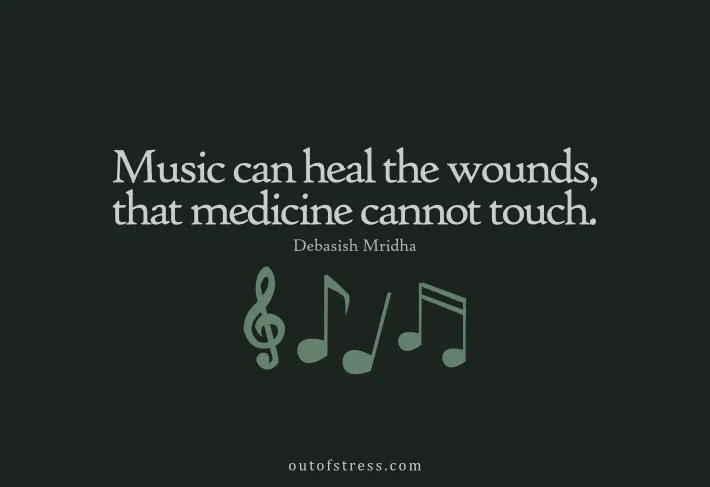
Some people choose to relax by listening to their favorite artists or band. Resonating with particular lyrics, songs, or albums. You often find that certain songs relate and bring back memories of a certain time in your life- sometimes this might not conjure up good memories but on the whole, music can transport you to a positive place or help you to relive a good time! Music allows you to express yourself and acts as a form of release.
There are a number of apps that allow you to listen to music through your phone. It’s worth giving it a go if you need cheering up or are gearing up for an exciting event or outing. It's always a good idea to have some self-care playlist on hand that will really help you feel better.
This is a good time to consider Spotify as it makes it easy for you to create and organize playlists. Share these playlists or albums with others. With all the modern technology we have at our fingertips, we can easily share playlists on Spotify or Apple Music. In fact, you can even build a collaborative playlist with others. Create a theme, such as happy songs, pump-up songs, chill songs, etc, and share your favorites! A great place to start is by making an “energize” and a “calm down” playlist.
Then, take some time to figure out your best option for sound quality, such as headphones or a Bluetooth speaker rather than the speaker on your phone or laptop.
Sing as loud as you can with the playing music no matter how bad it sounds. Let the music heal you and change your life in little ways.
Here's a playlist by Led Zeppelin if you like soft rock music:
Step 4: Look into the mirror and say ‘I am enough’ till you mean it.
When you look in the mirror, what do you see? What do you focus your attention on? What words do you tell yourself and what images go through your mind?
We all fall into the trap of focusing on our weaknesses. The truth is we can’t be good at everything so why bother trying to be. I’ve tried in my life to be good at so many things and failed. Instead of focusing on the failures, try to start focusing on your single best trait. How you feel about yourself matters. Those ridiculous insults you say to yourself are blocking the true person inside of you from escaping and unleashing all the passion, and talent that the world has to offer. You’re more talented and smarter than you think.
The number one way to love yourself more is by truly believing that you are enough. I have watched over and over how a simple, profound, and life-changing mantra of ‘I am Enough’ can build self-love and eliminate any limiting beliefs forever. When you know that you are enough everyone around you will know that you are enough too. Your life will be so different and so much better when you can resonate your enough-ness at a level that positively impacts your career, your relationships, and your happiness levels.
You can use the power of stating that you are enough, that you always have been and always will be, to achieve success in every key area of your life. When you say it, think it, and believe it, and make it an automatic and regular part of your life you can expect to see wonderful improvements in your relationships, in your career, and in how you feel about yourself.
Put this into your affirmations list which will eventually manifest because our thoughts are affirmations we tell ourselves in the inside and they can direct us towards a happy life or painful life. If we say good things to ourselves, we will focus on the good, and our life will improve. If we say bad things, we will focus on heartache and pain and get more of them in our life.
Sometimes, you just need a reminder. It sure is cheaper and shorter than taking medication or going to a therapist.
Wishing you a good mirror experience.
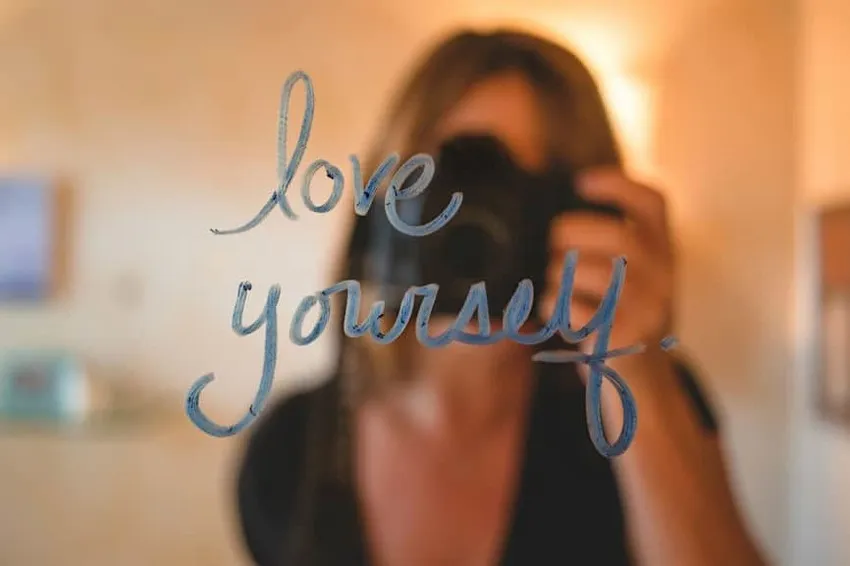
Step 5: Go to the terrace or the highest you can go and realize life can be amazing.
Sometimes while juggling between our work-life and our family life, we forget that we have a life, a purpose apart from that as well. Just go out on your balcony/terrace not doing anything just walking.
Step out and be amidst nature. Absorb in the nature around you, appreciate that natural beauty, and just take it all in. It might look like it’s not a big deal, but when you’ll actually try it, you’ll know how much these little things actually matter!

Raise your head and watch the beautiful blue sky and those cotton-candy clouds. It will make a lot of difference. And if you are not a cloud-watching type of person, go for sunsets and sunrise. Accompanied by a hot beverage, it always helps in calming the mind.
Take a moment to pause and ponder if anything we’re doing even matters if we’re not in good mental and physical shape, we can hear the obvious answer loud and clear in our heads.
Immersing ourselves in things around us changes our perspective on the concept of ‘time’, how we feel tied to it, stressed by it, and enslaved by it. It can positively impact stress, anxiety, blood pressure, and heart health.
Looking your city from a different angle will help you to go back to your roots, climb ladders you didn’t know were present before, running and flying kites, and basking in the sun, luxuries that we have but we don’t value. Take time to breathe, be mindful, and if nothing else just embrace the world the way it is.
Step 6: Take a few Tablespoons of yellow/ green/ red/ any paint and apply it on a surface like canvas. Use hands for the best effects.
Creative self-care is about feeding your soul. There are moments in life where each one of us feels overwhelmed, exhausted, lost, in pain, betrayed, alone, or afraid. That’s exactly where art steps in. No matter whether you choose to create it yourself or simply observe and enjoy it, art is a relaxing and inspiring activity for most people. It's therapeutic. Get your hands in the paint for a much needed moment of de-stressing.
Art and Art based-therapy are integral to healing and self-care transforming the experience of hospitalization from a space of healing to holistic well-being, elements of joy, autonomy. It not only allows expression, but also the mastery and control over media, the ability to alter it, and through that find solutions, support, and hope whilst allowing spaces for grieving, anger, joy and finally balance.
It is such a powerful reminder of the strengths we have, thoughts, and feelings that we don’t remember in the moments of crises, and of course, there is nothing quite like the pleasure and joy of creating.
Here's how Art Therapy help to release and heal you:
There are layers of what can come up through art for different people. Each piece and so many more speak volumes about the depth of what we are trying to communicate, tapping into places that sometimes we don’t have the words to describe. When words fail us, we use art.
The language of art allows us to speak beyond what it is, to delve into what it means, and the magnitude of emotion that one might feel. Here’s to identifying the little joys of life and letting ourselves realize that colors, paints, and creativity are the consistent little vacations that could be our ‘new normal’.
Just pick up the brush with the “wrong” hand and see what comes out. This exercise is about getting out of your own way. You don’t need to be an “artist” or “creative” to do the creativity challenges.
Think you have “no artistic talent?” - Good. Paint something really ugly. That’s stretching your comfort zone, taking a chance, and facing a small fear to say, “In your face!”
This is the magic in a colour that we can’t ignore. When you feel in every color using visual art as an extension of ourselves to break barriers and say something. Its time we go back to colors to look away from our phones and connect to our deeper selves in a rare and powerful way.
Step 7: Talk to your parents, grandparents, or anyone elder to you. Talk about their time. Laugh with them. Crack up with them.
With so many competing demands on time and attention, it is harder than ever for you to spend quality time with your parents or grandparents.
They are a security blanket. If there's somebody you can trust and know is always on your side, it's them. Take advantage of small moments throughout the day, like having a cup of tea with them or go grocery shopping to run errands or help them wash the dishes. Have dinner together as many times as possible during the week.
While that sounds impossible to some families, you can schedule around dinner just like you schedule around soccer practice or homework time. Come up with creative and fun ways to spend time together during the week or on the weekend. Whether you start a board game night or plant a family garden, there are many ways to have a great time while staying unplugged.
Take advantage of small moments throughout the day, like having a child come along with you while you run errands or help wash the dishes. Have dinner together as many times as possible during the week. You can schedule around dinner just like you schedule around soccer practice or homework time.
Come up with creative and fun ways to spend time together during the week or on the weekend. Whether you start a board game night or plant a family garden with your parents, there are many ways to have a great time while staying unplugged.

Grandparents often say they had to step in to keep their grandchildren safe, provide emotional support, and create a calmer environment. The emotional closeness between adult grandchildren and their grandparents protects against depression for both. Children who are very close to their grandparents will learn many funny stories about the childhood of their parents and thus develop their sense of belonging to the family. In addition, the unconditional love of their grandparents helps them to be more confident and feel safe with other people than their parents.
They have much more free time to spend with the kids and more patience as well with emphasization with their genuine level of understanding of life. Their experience in raising children can also be useful as long as it is needed and not imposed.
So if you have a harmonious relationship with the adults around you, you are most likely to have a different view of the world altogether. Schedule common vacations and encourage your grandparents to come and visit. Make the most of the benefits of technology. Get yourself to talk to your parents and grandparents, communicate by email and social websites, send them your latest photos, etc.
Step 8: Make Notes, Journal, write about everything, clean, remove the clutter in your room and soul.
I’m sharing why clearing the clutter and choosing to own less can help you take better care of yourself – physically, mentally, and emotionally! Too much “stuff” and clutter can cause a significant amount of stress in your life in a variety of ways. Clutter can often cause you to feel discontent and generally unhappy with your space. Most of us want our space to be a shrine where we can retreat to and relax in. But a cluttered home makes rest and relaxation difficult. Not only are you bombarded by visual clutter, distractions, and “stuff” all the time. Which never gives your mind and your eyes white spaces to rest on.
On the other hand, clearing the clutter and removing the excess and the distractions from your home can have a really positive impact on your life and your well-being. Decluttering is freeing in so many ways. Letting go of the excess “stuff” that fills your home often feels like a weight is lifted from your life. Sometimes we don’t even realize how heavy and burdened our stuff makes us feel until we start letting it go! And once you start letting go, it can feel like such a big relief as you feel lighter and happier and begin experiencing the benefits of less.
Here's how cry helps to clarify your emotions:
Clearing the clutter means less of your mental capacity is taken up managing the “stuff” you own. You have less decision fatigue, simply because you own fewer things and have fewer things to decide about. When your brain isn’t constantly being distracted by all of the “stuff” and clutter surrounding you, you have more ability to focus and concentrate. Removing the physical clutter from your home can help clear the mental clutter as well, as your to-do list shrinks and the distractions lessen.
Whether you're dealing with a difficult decision, organizing a complicated project, or feeling confused, stressed, or anxious about something — or about nothing — try keeping a journal. Daily writing about emotionally significant experiences can improve our immune system, probably in a way not totally different from exercise, which is by reducing the chemicals that stress releases in our bodies. Journaling is not just a little thing you do to pass the time, to write down your memories — though it can be — it’s a strategy that has helped brilliant, powerful, and wise people become better at what they do.
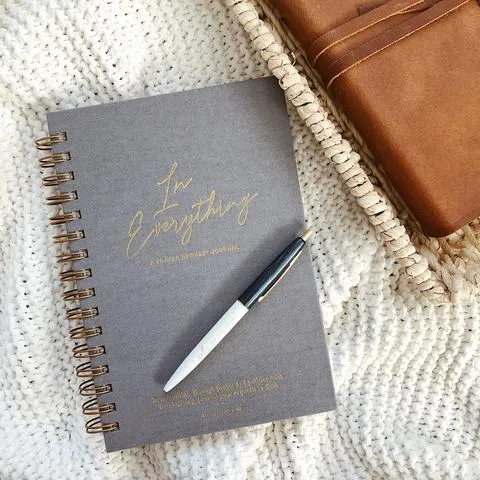
Your journaling is not your performing for history. It’s you reflecting. It’s you working through your problems. It’s you figuring things out and clearing your head. Write about the maddingly frustrating people you encountered today. Write about the wounds you still carry from childhood. The person who didn’t treat you right. The terrible experience. The parent who was just a little too busy or a little too critical or a little too tied up dealing with their own issues to be what we needed.
The sources of anxiety or worry, the frustrations that routinely pop up at the worst times, the reasons you have trouble staying in relationships, whatever problem you are dealing with—take them to your journal. You’ll be shocked by how good you feel after. At first, it might not seem as effective as decluttering your house but in long run, it helps you heal in a way like no other. Decluttering is important whether it’s of your space or soul. Really important in fact!
Step 9: Let cry to release toxins and emotions. Serve with gratitude.
(Best with a bowl of your favorite food, I prefer Mac and cheese)
Everyone's had one of those days when everything seems to go wrong. Your alarm fails to go off, you run out of gas on the way to work for which you're already late, you spill coffee all over your desk and get stuck in a traffic jam on your way home. At the end of the day, all you really want to do is take a hot bubble bath and crawl into bed. At this point, some of us resort to nature's tried and true stress relief method - crying.
Obviously, more serious and traumatic experiences can turn on the waterworks instantly, including births, deaths, illnesses (particularly of children or parents), infidelity and violent crimes. The most common causes of crying, however, are low-level stress or frustration and watching something sad. It all starts in the cerebrum where sadness is registered. The endocrine system is then triggered to release hormones to the ocular area, which then causes tears to form.
Here's a guided crying Meditation for healing for you:
The phrase "having a good cry" suggests that crying can actually make you feel physically and emotionally better, which many people believe. Some scientists agree with this theory, asserting that chemicals build up in the body during times of elevated stress. These researchers believe that emotional crying is the body's way of ridding itself of these toxins and waste products.
They also believe that crying could be a safety mechanism of sorts because it rids the body of stress-related toxins. Whether or not you buy into this theory, most psychologists believe that holding your emotions in can be dangerous over the long-term.
In fact, some research indicates that stifling emotional tears can cause an elevated risk of heart disease and hypertension. Other studies have shown that people suffering from such conditions as colitis or ulcers tend to have a less positive attitude about crying than their healthier counterparts. Psychologists recommend that people suffering from grief express their emotions through talking and crying, rather than keeping their emotions in check.
Overall, it's important to remember that crying is a critical part of the human emotional makeup, just as laughing is. While you may not want to cry in front of your boss or an ex-boyfriend who's with his beautiful new girlfriend, it is largely believed to be better both emotionally and physically to "let it out" rather than keeping it all inside.
Gratitude doesn’t make problems and threats disappear. You can lose jobs, you can be attacked on the street, you can get sick. Remembering those times, your heart must be beating faster and your throat constricts. Your body wants to hit something or run away, one or the other. But there’s nothing to hit, nowhere to run. The threats are indeed real, but at that moment, they exist only in memory or imagination. You are the threat; it is you who is wearing yourself out with worry.
That’s when you need to turn on the gratitude. If you do that enough, gratitude might just become a habit. What will that mean to you? It means, that you increase your chances of psychologically surviving hard times, that you stand a chance to be happier in the good times. Here, you are not ignoring the threats; you are just appreciating the resources and people that might help you face those threats.
Happy self-healing and caring!!
Opinions and Perspectives
Nice to see practical self-care advice that doesn't involve buying anything.
That statistic about superficial social exchanges due to phones is concerning.
Been doing the mirror affirmations for a week. Feeling subtle changes.
Started talking more with my grandparents after reading this. Such valuable conversations.
I've started implementing the phone boundaries and already notice a difference.
Taking time to notice architectural details instead of looking at phones is such a simple but powerful idea.
Never thought about dry brushing before showering. Going to try that tomorrow.
The part about watching people instead of phones on public transport is so true.
The article makes a good point about social media reducing meaningful interactions.
Really appreciate the practical steps rather than just vague wellness advice.
That statistic about phone interactions affecting cognitive resources is eye-opening.
The point about mindful phone usage rather than complete elimination makes more sense to me.
Interesting article but missing some basics like exercise and healthy eating.
I tried the decluttering tip last weekend. It's amazing how much mental space it freed up!
The crying part seems counterintuitive but I actually feel so much lighter after a good cry.
I've found that combining some of these works better. Like journaling on the terrace during sunset.
These are nice suggestions but seem a bit privileged. Not everyone has access to a terrace or art supplies.
The part about talking to elderly relatives hit me hard. We often forget how much wisdom they have to share.
Has anyone actually managed to stay off their phone first thing in the morning? I keep trying but failing.
The journaling suggestion really works! I've been doing it for 3 months and my anxiety has decreased significantly.
I actually disagree about the loud music part. Sometimes silence can be more healing than noise.
The nomophobia thing is real. I get anxious when my phone battery is low, even if I don't need it for anything important.
I love the idea about painting with your hands. It reminds me of being a kid when we didn't overthink everything.
That hot shower tip is underrated. I've started taking longer showers lately and it's become my daily meditation time.
Anyone tried the mirror affirmations? I feel silly talking to myself but maybe there's something to it?
The statistics about checking phones 85 times per day really hit home. I probably do even more than that honestly.
I'm skeptical about the phone part. How realistic is it to completely disconnect in today's world?
These tips are exactly what I needed right now. I've been feeling overwhelmed lately and really need to focus on self-care.
